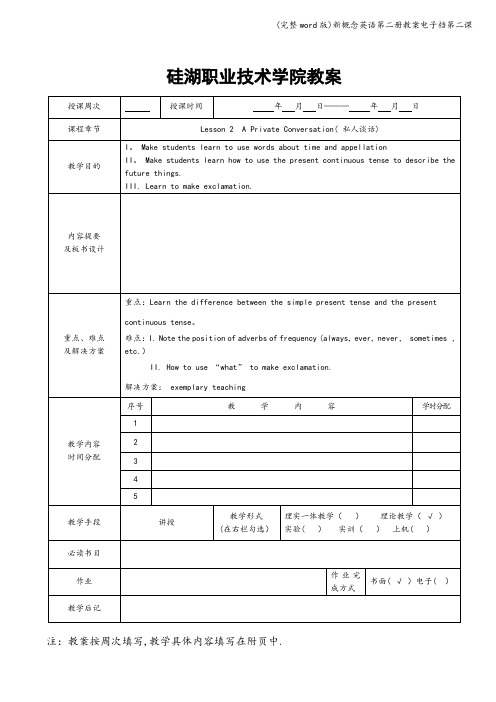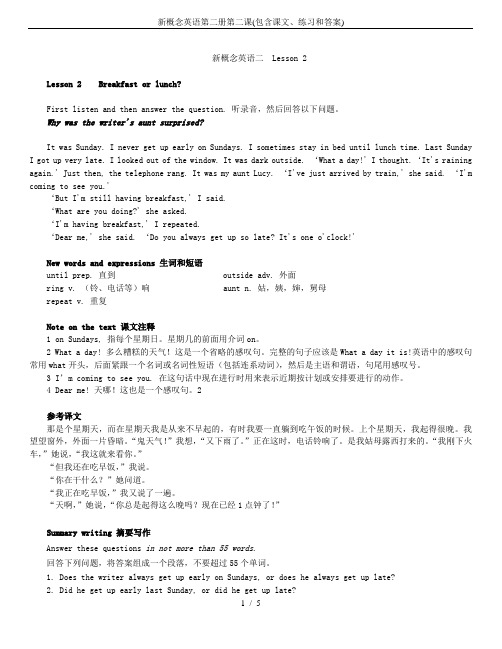新概念英语第二册Lesson2第二课时精编版
新概念英语第二册Lesson2

[beə] v.容忍
11. business ['biznis] n.事
12. rudely ['ru:dli] ad.无礼地,粗鲁地
Lesson 1 A private conversation 私人谈话
Last week I went to the theatre. I had a very good seat. The play was very interesting. I did not enjoy it. A young man and a young woman were sitting behind me. They were talking loudly. I got very angry. I could not hear the actors. I turned round. I looked at the man and the woman angrily. They did not pay any attention. In the end, I could not bear it. I turned round again. 'I can't hear a word!' I said angrily. ‘It’s none of your business,' the young man said rudely. 'This is a private conversation!'.
观观察察下下面面两两个个句句子子::
TThheeppoolilciceemmaannaarreressteteddththeeththieief.f. 警警察察逮逮捕捕了了小小偷偷。。 TThheeththieieffaarreressteteddththeeppoolilciceemmaann.. 小小偷偷逮逮捕捕的的警警察察。。
新概念英语第二册Lesson 2

Breakfast or lunch
1.until prep / conj.(连词)
我一直躺在床上直到我妈妈叫醒我。
I stayed in bed until my mother woke me up. I didn't get up until my mother woke me up. until 主句中动词为延续性动词。
not…until 主句中动词为非延续性动词。
我会一直等到你回来。 I will wait for you until you come back. I won’t leave until you come back.
2.outside n./adj./adv./prep.
反义词:inside
例句:the outside of the house (n.) an outside toilet(adc j.) Please wait outside.(adv.) It's out感叹句 (2)以How 引导的感叹句
How + adj.\ adv. +主语+谓语动词 你竟然不知道发生了什么,真是太令人吃惊了! How _s_u_r_p_r_is_in_g____ it is you did not know what happened!
一般现在时
位置:实义动词之前, 助动词之后
5.repeat v. 重复 这个问题我重复好几遍了。 I repeated the question several times. 令我惊讶的是,他重复这个问题好几遍。 To my surprise,he repeated the question several times.
6.surprise n. 惊喜
(完整word版)新概念英语第二册教案电子档第二课

在英语中可用what引导的感叹句来表示惊奇、愤怒、赞赏、喜悦等感情,在感叹中主谓语采用正常语序.
来源:It is a bad day. → What a bad day it is!
III. Learn to make exclamation.
内容提要 及板书设计
重点、难点 及解决方案
重点:Learn the difference between the simple present tense and the present continuous tense。
难点:I. Note the position of adverbs of frequency (always, ever, never, sometimes , etc.)
2
Discussion
1.Do you get up early every day?
2.What time do you usually get up every day?
3.Do you find it easy or difficult to get up?
4.When do you usually get up on weekends?
介词on一般用于表示某一天的时间短语中:on Monday,on Monday morning,on that day
当使用last,next,this,that时,介词(以及定冠词)必须省略:
我下周(这周)来见你。I’ll see you next/this Friday.
3。I sometimes stay in bed until lunchtime.
(完整版)新概念英语第二册第二课(包含课文、练习和答案)

新概念英语二 Lesson 2Lesson 2 Breakfast or lunch?First listen and then answer the question. 听录音,然后回答以下问题。
Why was the writer's aunt surprised?It was Sunday. I never get up early on Sundays. I sometimes stay in bed until lunch time. Last Sunday I got up very late. I looked out of the window. It was dark outside. ‘What a day!' I thought.‘It's raining again.' Just then, the telephone rang. It was my aunt Lucy. ‘I've just arrived by train,' she said. ‘I'm coming to see you.'‘But I'm still having breakfast,' I said.‘What are you doing?' she asked.‘I'm having breakfast,' I repeated.‘Dear me,' she said. ‘Do you always get up so late? It's one o'clock!'New words and expressions 生词和短语until prep. 直到 outside adv. 外面ring v. (铃、电话等)响 aunt n. 姑,姨,婶,舅母repeat v. 重复Note on the text 课文注释1 on Sundays, 指每个星期日。
新概念英语第二册 lesson 2

一般现在时的用法
• 表示习惯性动作, 真理! 是过去、现在和未来都会发生的事 情。一般现在时一般与频率副词 often,always, sometimes,never,frequently,rarely,ever 等连用。 • 1)表示经常、反复发生的动作,现存的习惯或状态。 • We are Chinese. • 2)表示客观事实或普遍真理。 • The earth goes round the sun. • 3)表示安排或计划好的未来的动作,只限于go, come, leave, start, stay, return, arrive, begin, be 等动词。 • My train leaves at 6:30 this morning. • 4)表示主语的特征、性格、能力等。 • She is always ready to help others.
一般现在时第三人称单数变化规则
• 1.)一般情况下,直接加 -s • eg. works, plays, rains, sees • 2.)以 sh, ch, s, x 或 o 结尾的词后加 –es • eg. washes, teaches, fixes, does, goes • 3).以辅音字母加 -y 结尾的,先把 ‘y’ 改成‘i’,再加 -es • eg. studies, flies, carries
New Concept English Book2
Lesson 2 Breakfast or Lunch?
【New words and expressions】
until prep.直到
outside adv. 外面(作状语) ring(rang. rung) v.(铃、电话等)响
aunt
新概念英语第二册2课Lesson2(课堂PPT)

The Lord of the Rings
• ring 戒指 • ring finger
11
பைடு நூலகம்
• ★aunt n. 姑,姨,婶,舅妈 • (所有长一辈的女性都用这个称呼) • 男性则是uncle: 叔父,伯父,姨丈 • 他们的孩子:cousin 堂兄妹(不分男女) • cousin的孩子: • nephew 外甥; • niece 外甥女
• "What a day!" I thought ."It's raining again ."Just then ,the telephone rang .It was my aunt Lucy." I've just arrived by train," she said." I'm coming to see you." "But I'm still having breakfast," I said. "What are you doing?" she asked. "I'm having breakfast," I repeated. "Dear me ,"she said ."Do you always get up so late ?It's one o'clock!"
12
• ★repeat v. 重复 • ① vt. 重复 • Will you repeat the last word? • They are repeating that wonderful play. • ② vi. 重做,重说 • Please repeat after me. • Don’t repeat.
新概念英语第二册lesson_2

I am never late for class. 一类词:never、often、always、 sometimes、seldom We often meet at the coffee shop. She is always nice and friendly to people. I seldom watch TV. ❷. On Sundays:每逢星期天 I often go shoping on sundays.
5. 达(较小的地方) eg. He arrived at the station at six this morning.
(
arrive in
到达(较大的地方) eg. She arrived in Paris on Friday.
• 6.★aunt n.姑,姨,婶,舅妈(所有长一辈的女性都用 这个称呼) • 与此相同, 男性则是uncle: 叔叔 • 他们的孩子 : cousin /'kʌzən/ : 堂兄妹(不分男女) • cousin的孩子 : nephew /'nefju/ : 外甥 niece /niːs/ : 外甥女
Steps:
1)Have/make a reservation /rezə'veɪʃ(ə)n/ smoking section/area/seating non-smoking section/area/seating
2) order dishes
❶What is the specialty of the dining hall? 餐厅最特别的菜式是什么?( daily chef’s special ) eg:beef steak.
1.It was Sunday. I never get up early on
新概念英语第二册逐句精讲语言点第2课(2)

新概念英语第二册逐句精讲语言点第2课(2)Lesson 2 Breakfast or lunch课文内容:It was Sunday. I never get up early on Sundays. I sometimes stay in bed until lunchtime. Last Sunday I got up very late. I looked out of the window. It was dark outside."What a day!" I thought. "It's raining again." Just then, the telephone rang. It was my aunt Lucy. "I've just arrived by train, " she said. "I'm coming to see you.""But I'm still having breakfast," I said."What are you doing?" she asked."I'm having breakfast," I repeated."Dear me," she said. "Do you always get up so late? It's one o'clock!"精讲笔记:4.I looked out of the window.我向窗外望去。
语言点 look相关短语:1)look out of向外看(后常接门、窗等)2)look out=be careful当心,小心:Look out! There is a danger ahead.当心!前面危险。
- 1、下载文档前请自行甄别文档内容的完整性,平台不提供额外的编辑、内容补充、找答案等附加服务。
- 2、"仅部分预览"的文档,不可在线预览部分如存在完整性等问题,可反馈申请退款(可完整预览的文档不适用该条件!)。
- 3、如文档侵犯您的权益,请联系客服反馈,我们会尽快为您处理(人工客服工作时间:9:00-18:30)。
3. Where does John come from?
4.Where are you playing football?
5.What an interesting book it is!
Exercises
A1. I am looking out of my window. I can see some children in the street. The children a_r_e_p_la_y_ing(play) football. They always __p_la_y__ (play) football in the street. Now a little boy i_s_k_ic_k_in_g(kick) the ball. Another boyis__ru_n_n_in_g(run) after him but he cannot catch him.
Page 18
1.What a wonderful garden (this is)! 2. What a surprise (this is)! 3. What a lot of trouble he is causing! 4. What wonderful actors (they are)! 5. What a hard-working woman (she is)! 6. What a tall building (it is)! 7. What a terrible film (it is)! 8. What a clever boy you are! 9. What a pretty girl (she is)! 10. What a strange guy (he is)!
B. 1.she rarely answers my letters. 2.we never work after six o'clock. 3.The shop always close on saturday
afternoons. 4.Do you always go to work by car? 5. Our teacher frequently collects our
until 用于表示动作,状态等的持续,后面加 (时间状语)从句 "一直到... ...为止" , "在... ... 以前" 在肯定句中: 表示持续性状态的动词连用,表示持 续到某一时刻
eg. I'll wait here until 5.
在否定句中(not until): 通常与描述短暂动作的动词 词组连用
4. plays playing 5.studies studying 6.runs running
7. sees seeing 8.washes washing 9.watches watching
10.gets getting 二、1.plays 2.goes 3. Do/ brush 4.Does/do
• 频率副词往往放在句子中间, 实义动词 前, 非实义动词后
• 如果既有实义动词又有非实义动词, 要 放在两个之间.
• 非实义动词 :
• 1.系动词(be)
2.助动词帮助动词构成时态的(do, does,did, will, shall, have, had, has)
3.情态动词 : (must, can, may) 除此之外 都是实义动词.
exercise books. 6.We sometimes spend our holidays
abroad. 7.I often buy CDs. 8.Do you ever buy CDs?
5. What a day!(it is) 省略感叹句 (以what引导感叹句表示愤怒,喜 悦,惊奇,赞赏等感情)
in,on,at 的用法
• in 时间范围较广,表示某年,某季节,某月,某周,某 一天的某段时间
in a year 在一年中
in spring 在春季
in May 在五月
in a week 在一周中
• on 表示某一天或某一天的某段时间
on Monday在周一
on March 7th 在3月7号
on Monday afternoon 在周一下午
2 . I carried my bags into the hall.
‘What__a_re__ you __d_o_in_g_ (do)?’ my landlady asked.
‘Ia_m__le_a_v_ing(leave), Mrs. Lynch, ’ I answered.
‘Why __a_re__you __l_e_av_i_ng(leave)?’ she asked. ‘You have been here only a week. ’
2.arrive vi. 到达,抵达
arrive at
他今天早上6点到达车站。
He arrived at the station at six this morning.
我晚上很晚到达酒店。
I arrived at my hotel late in the evening.
(经过努力)达到,做出
After many hours talk, the committee arrived at a decision.
Lesson2 Breakfast or lunch?
a story about a man who doesn't like getting up early on Sundays.
Part B
Key structures
• 本课的重点句型是现在进行时和一般现在时. 1 . Now——现在进行时(说话的当时正在发生, 现阶段
一般现在时的适用范围
(1)表现在的事实、状态或动作 eg. Birds fly. She loves music. Mary's parents get up very early.
(2)表习惯性动作或职业,常与时间副词连用 eg. I always take a walk after supper. She writes to me very often.
seldom • I'm never late for appointments. • Sometimes he tells us jokes. • We often meet at the coffee shop. • She is always nice and friendly to people. • Are you still working? • I seldom watch TV.
• The orkers are building a new bridge across the river.
• We are preparing for our final examination this week.
Key structures • Often , Always——一般现在时. • 表述频度的副词 • never、sometimes、often、always、still、
on the morning of March 7th (2013)
• at 表示某个具体时刻
at two o'clock 在两点 at this moment 在这一刻
注意:如果时间名词前用 this,that ,next, last等修饰时, 不需要用介词
正在发生的动作) 现在进行时的基本形式:is / am / are + 现在分词 • I am working as a teacher now.
The kettle is boiling. Shall I make tea?
• Don't you think you eat too much? You're putting on weight.
"直到... ... 才" eg. She cannot arrive until 6.
I didn’t go to sleep until 11’o clock last night.
4.But I’m still having breakfast, I said. have breakfast/lunch/supper have a great breakfast
Language points
1.I never get up early on Sundays. On Sundays :指每个星期。
星期几、具体的某一天都用on
They will be here on Tuesday (morning /afternoon). I was born on July 1st. We’ll see you on Christmas Eve.
三、1.Tom doesn't do his homework at home every day.
Does Tom do his homework at home every day?
2. Amy isn't playing computer games. Is Amy playing computer games?
‘A week too long, Mrs. Lynch, ’ I said. ‘There are too many rules in this house. My friends never __c_o_m_e_ (come) to visit me. Dinner is always at seven o'clock, so I frequently _g_o____ (go) to bed hungry. You don't like noise, so I rarely __li_s_te_n_ (listen) to the radio. The heating doesn't work, so I always __fe_e_l__ (feel) cold. This is a terrible place for a man like me. Goodbye, Mrs. Lynch. ’
